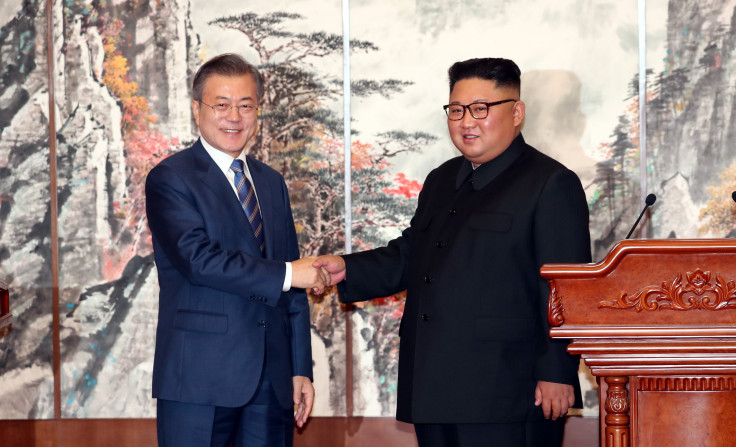Kim Jong Un-Moon Jae-In Summit: North Korea Denuclearization, 2032 Olympics, Other Highlights

North Korean leader Kim Jong Un met with his South Korean counterpart Moon Jae-In in the third summit between the two leaders in Pyongyang on Tuesday, during which they discussed a broad range of topics including denuclearization, reducing military tension and co-hosting the 2032 Olympics.
“The world is going to see how this divided nation is going to bring about a new future on its own," Kim promised on the second day of the three-day summit. Moon echoed similar sentiments when he said, "The era of no war has started.”
Here are a few important highlights from the Pyongyang summit, courtesy South Korean news outlet Yonhap News:
Denuclearization talks
Kim agreed to implement additional measures for denuclearization during the summit in Pyongyang.
"The North has agreed to permanently shut down its Dongchang-ri missile engine testing facility and missile launch pad under the participation of experts from related countries," Moon said in a joint press conference with Kim after the summit.
Also, in a gesture to restart the stalled discussions on denuclearization with the United States, the North Korean leader agreed to permanently shut down the Yongbyon nuclear facility, given the U.S. hold up their end promises made during the June 12 Singapore summit.
The two leaders also agreed to remove all nuclear weapons and threats from the Korean Peninsula.
"The September declaration will open a higher level for the improvement in relations (between the South and the North) ... and bring closer the era of peace and prosperity," Kim said.
Meanwhile, President Donald Trump praised the actions taken by North Korea, adding that Kim had also agreed to nuclear inspections.
"Kim Jong Un has agreed to allow Nuclear inspections, subject to final negotiations, and to permanently dismantle a test site and launch pad in the presence of international experts. In the meantime there will be no Rocket or Nuclear testing. Hero remains to continue being," he tweeted.
Reduce inter-Korean military tension
In the agreement signed by Defense Minister Song Young-moo and his North Korean counterpart, No Kwang Chol, after the Pyongyang summit, the two Koreas agreed to set up maritime, air and ground buffer zones in front-line areas as part of reducing accidental clashes, building trust and reducing overall military tension between them. This included setting up a buffer zone in the Yellow Sea to suspend gun firing, maritime drills and establishing a no-fly zone in border areas.
They also agreed to pull out 11 border guard posts each by the end of the year, halt border military drills near the military demarcation line (MDL) targeting each other from Nov. 1 and disarm the Joint Security Area in the Demilitarized Zone (DMZ).
"(The two sides) have decided to completely halt all hostile acts in all spaces, land, sea and air, and agreed on concrete measures to implement the decision," Seoul's defense ministry said in a press release.
Co-hosting the 2032 Olympics
After the 2018 Winter Olympics in South Korea's PyeongChang in February, where the two Koreas combined their women's hockey teams for the first time in Olympic history and marched behind the Korean Unification Flag at the opening ceremony, Kim and Moon agreed during the summit to work together to co-host the 2032 Olympics.
The leaders said their cooperation in bringing in the 35th Summer Games to the Korean Peninsula will be a historic step toward fostering harmony between the two nations — a move that was lauded by Trump.
Kim and Moon also agreed to work on forming more unified teams at the 2020 Tokyo Olympics and other international competitions.
Kim Jong Un to visit Seoul
After Kim promised to visit Seoul in the near future, Moon said the North Korean leader will pay his nation a visit before the end of this year, provided that there arises no "special," unexpected conditions.
"It would serve as an epoch-making turning point in South-North relations," Moon said. This would be the first visit by a North Korean leader to Seoul.
Inter-Korean Agreement
At the end of their summit talks in Pyongyang, the leaders of both Koreas signed an agreement, the details of which were not immediately revealed. The agreement was signed in a ceremony held at the North's state guesthouse Paekhwawon and broadcasted live in Seoul.
© Copyright IBTimes 2024. All rights reserved.






















